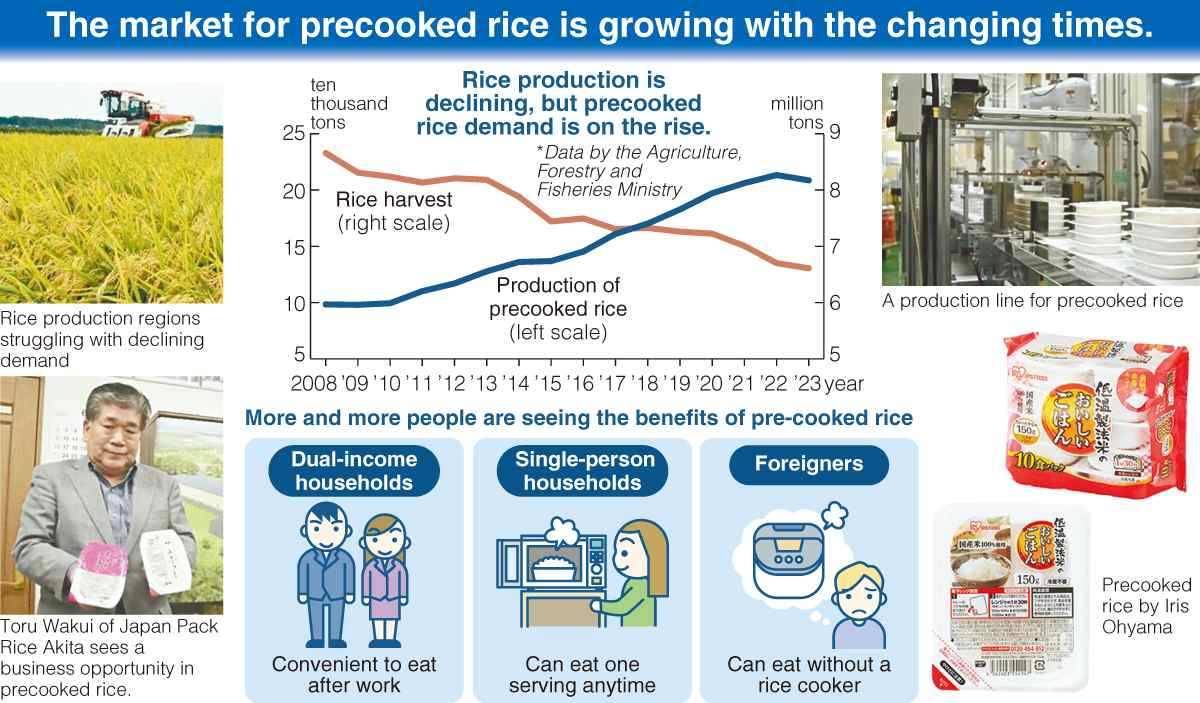Japanese Farmers Get Financial Boost From Prepackaged Rice; Popularity Grows Amid More Dual-Income, Single-Person Homes

6:00 JST, October 4, 2024
Precooked rice packets may be the savior of rice farmers in Japan as domestic demand for uncooked rice declines, while the market for precooked rice is steadily growing.
Known as pakku gohan in Japanese, precooked rice is very convenient because it needs to be microwaved for only a few minutes, making a rice cooker unnecessary. Production reached record highs for 13 consecutive years through 2022. Due to this trend, some rice-producing regions have started to grow more rice.
“It won’t matter if rice cookers stop selling well,” laments actor Ryo Yoshizawa in an Iris Ohyama Inc. commercial featuring the company’s precooked rice.
Rice cookers are part of the Sendai-based company’s main line that focuses on household goods and home appliances. However, the company entered the precooked rice business in 2015, in part to help promote local agriculture following the 2011 Great East Japan Earthquake that affected Sendai and other areas.
“Our sales are growing faster than the market average, thanks in part to the commercial,” said a manager in the company’s food business division.
Precooked rice was first produced less than half a century ago. It is believed to have originated in the late 1980s during technical research done at Niigata Prefecture’s food research institute. The first commercialized product was launched in 1988 by Sato Foods Co., which was known for its Sato no Gohan (Sato’s rice) precooked rice. After the 1995 Great Hanshin Earthquake, precooked rice quickly caught on as an emergency food to keep in stock.
According to the Agriculture, Forestry and Fisheries Ministry, the production of precooked rice in a process that sterilizes rice grains before they are cooked and then packaged in clean rooms has roughly doubled, from approximately 90,000 tons in 2008 to about 200,000 tons in 2023.
During this period, the domestic rice harvest declined by about 25%, decreasing from around 8.65 million tons to about 6.61 million tons. The drop was mainly caused by the diversification of the Japanese people’s diet as bread and pasta became more common. The decline of domestic rice consumption is expected to continue amid Japan’s declining population.
Easy to prepare
Despite these circumstances, precooked rice is selling well as an increasing number of people look for easy-to-prepare meals, and people have less time for cooking with the rise of dual-income and single-person households.
Farmers are beginning to pay attention to this growing market.
Toru Wakui is a chairman of Ogata Village Akitakomachi Rice Producers Co. in Ogata, Akita Prefecture, that handles rice production, processing and sales. Wakui and others establish Japan Pack Rice Akita in 2020 in the village.
The company produces about 36 million servings of precooked rice per year, with support from central governmental subsidies and local bank investment, among others.
The village was established in 1964 by reclaiming a large portion of Hachirogata Lagoon, the second largest in Japan at the time. The aim was to alleviate post-World War II food shortages. However, the local community has struggled with the recent slump in demand for rice.
Export potential
Ogata Village Akitakomachi Rice Producers Co. is now trying to overcome the slump by promoting precooked rice.
“Local farmers will finally be able to produce rice energetically,” Wakui said.
The possibility of overseas expansion also encourages the project.
Rice has traditionally been considered unsuitable for export, and farmers have largely relied on domestic consumption. Precooked rice is easy to sell overseas, even to people who do not have rice cookers.
The export value in 2023 was still modest at ¥1 billion, but that figure is double compared to five years ago. The recent depreciation of the yen has also helped improve the product’s price competitiveness against rival products from South Korea and Thailand, which are better-known overseas.
To take advantage of the opportunity, Japan Pack Rice Akita is building its second factory to handle exports to countries such as the United States. The company plans to increase its production capacity to 100 million servings per year and is also seeking farmers to cooperate in securing its rice supply.
Major producers such as Iris Ohyama and Sato Foods also started new production lines this year.
The question is whether precooked rice made with delicious Japanese rice will be able to spread around the world.
Methods evolve in pursuit of taste
Some conventional precooked rice packets have a distinctive scent, partly due to the use of preservatives to extend their shelf life. In recent years, however, companies have evolved their production methods to achieve a taste as good as rice that is fresh from a rice cooker.
Iris Ohyama prevents the oxidation of rice by storing it at 15 C or lower. The company also eliminated the use of preservatives by using heat sterilization.
Recently, some companies have begun creating value-added products, with some featuring expensive varieties of rice or rice grown with little to no agricultural chemicals.
TableMark Co. is particular about the water it uses to cook rice. The firm cooks rice with groundwater drawn from the Uonuma region of Niigata Prefecture, where the company’s factories are located.
Competition in the precooked rice market is intensifying not only in terms of convenience for immediate consumption, but also good taste, which is valued by consumers.
Top Articles in Society
-

Producer Behind Pop Group XG Arrested for Cocaine Possession
-

Man Infected with Measles Reportedly Dined at Restaurant in Tokyo Station
-

Man Infected with Measles May Have Come in Contact with Many People in Tokyo, Went to Store, Restaurant Around When Symptoms Emerged
-

Woman with Measles Visited Hospital in Tokyo Multiple Times Before Being Diagnosed with Disease
-

Australian Woman Dies After Mishap on Ski Lift in Nagano Prefecture
JN ACCESS RANKING
-

Producer Behind Pop Group XG Arrested for Cocaine Possession
-

Japan PM Takaichi’s Cabinet Resigns en Masse
-

Man Infected with Measles Reportedly Dined at Restaurant in Tokyo Station
-

Israeli Ambassador to Japan Speaks about Japan’s Role in the Reconstruction of Gaza
-

Videos Plagiarized, Reposted with False Subtitles Claiming ‘Ryukyu Belongs to China’; Anti-China False Information Also Posted in Japan























